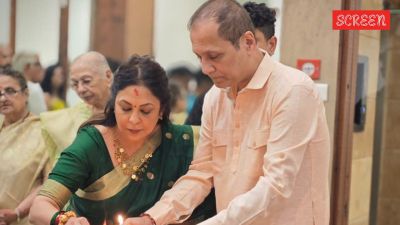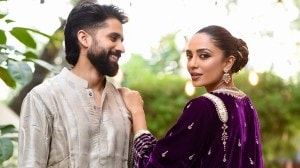Does it matter where they pray?
DREAM MERCHANT Shah Rukh Khan, actor ...

|
DREAM MERCHANT
|
|
Shah Rukh Khan, actor
|
| |
|
He’s Mr New India, as Raj/Rahul, the yuppie 20 somethings aspire to be. Yet, at 38, Shah Rukh is emphatic, ‘‘I have not yet played a Muslim character except a guest appearance in Kamal Hassan’s Hey! Ram … I will not play a Muslim just to get a Muslim audience.’’ But Shah Rukh has a deep relationship with God, saying, ‘‘Allah is the best painkiller.’’ He has read the Koran and the Prophet. ‘‘Tomorrow if my son Aryan or daughter Suhana ask me something about my religion, I should be able to answer their questions.’’ Yet he is equally keen his children know about their mother Gauri’s faith. He recites the Gayatri Mantra with Aryan. But post-9/11, the demonisation of Islam disturbs Shah Rukh, ‘‘You cannot term the entire Muslim community as terrorists. You can term a person a terrorist but not a religion.’’ He plans a series of talks in the US to drive home the point. |
|
|
THERE is a fast ball, which is a whirlwind. A whirlwind, delivered at a speed of over 90 kmph. It is a slowly gathering yet immensely powerful whirlwind, sweeping up thousands of new energies into a magnificent forward movement. In remote towers, geriatrics fume and fret. Demagogues whip up ancient hatreds and spur on their ignorant armies to kill and rape. Petty manifestoes screech “enemies”, “anti-nationals”, “traitors”. But the whirlwind can no longer be stopped, it comes ever on, it bounds over the spindly wickets of prejudice and soars upwards to the sky.
To the sky where a certain tricolour flutters. A tricolour that, 50 years ago, committed itself to the poorest voter and to the most destitute child and promised them the arrival of this whirlwind. Behold the icons of a new India: Irfan Pathan, Zaheer Khan, Mohammad Kaif, Shah Rukh Khan, Aamir Khan, Tabu, Azeem Premji, A.R. Rahman.
Where does the whirlwind come from? The answer is simple. It comes from the dreams of 1947, from a dream of democratisation. When the idealists of the past century gave themselves a republican constitution, when the poorest woman in the land was given a vote, when the rights of the citizen were placed at the centre of this country’s ideals, India was set firmly on a course very different from its neighbours.
The founding fathers may have been Oxbridge-educated but they wrote their own death warrants by laying down a plan in which old elites would be ‘‘exterminated from below’’. The figures speak: journalists and writers made up 10.4 per cent of the first Lok Sabha, but by the 10th Lok Sabha, their numbers had dwindled to 2.17 per cent. Lawyers made up 35.6 per cent of the first Lok Sabha, by the 10th, their numbers had fallen to 16.4 per cent. In contrast, farmers made up 22.5 per cent of the first Lok Sabha, by the 11th, they were up to 52 per cent.
“Today in all spheres of life in India, there is a broadbasing in progress,’’ says economist Bibek Debroy. ‘‘The phenomenon of a Najafgarh boy becoming a star is the same as the rise of a lad from the alleys of Vadodara. The Muslim community is among the most deprived communities of India. But as the centre of gravity shifts away from urban elites, more deprived communities, like Muslims, like tribals, will enter the mainstream.’’
The days of protection are gone. Those old days where India hid behind high tariff walls, its industry protected by licenses, its institutions secluded by privilege, those walls are gradually crumbling under the probing fingers of talent and innovation.
‘‘Market-led democratisation,’’ says economist Surjit Bhalla, ‘‘always destroys prejudice. Discrimination is simply bad economics. Not that you won’t have communal riots in a market democracy, but you are less likely to, simply because paying somebody a higher wage because he happens to be of the right religion doesn’t make economic sense. You only have to look at the BJP’s Vision Document to find that Hindutva has been defeated by the market and by globalisation.’’
As far back as 1957, economist Gary S. Becker wrote his famous work The Economics of Discrimination, in which he illustrated that in a competitive economy, if you discriminate on the basis of colour, race or religion, you actually have to pay a heavy price. Becker received the Nobel Prize in 1992 for his discovery.
|
INDIA’S NEW PIN-UP
|
|
Irfan Pathan, cricketer
|
| |
|
Ask R.K. Soni about Irfan Pathan. ‘‘He is our pride,’’ comes the reply. Soni’s jewellery shop is a stone’s throw from the Jumma Masjid in Mandvi, Vadodara. He has seen it all. From communal skirmishes to the victory procession after the ODIs in Pakistan — to a tall, lanky boy leaving home for practice. On March 24, when India won in Lahore, Irfan’s one-room house in the Jumma Masjid was surrounded by thousands of Hindus, screaming. Not wild slogans, just glory to Irfan Pathan. ‘‘There is no discrimination in cricket,’’ says Shamimbanu, Irfan’s mother, ‘‘The game is the religion.’’ At 19, Irfan is more than just India’s new pin-up. He is the balm for an old wound. ‘‘When Irfan captures a wicket, why does a Hindu jump in joy?’’ asks elderly Mandavi resident Ismail Khan, ‘‘it’s all about the country’s pride. And it’s time everybody understands this.’’ Amen. |
|
|
YET there remain crucial spaces where the whirlwind is stalled. Sure, in the entertainment industry, in sport, Bollywood, or television, even in enterprise, where talent is the prime need, religious identity is irrelevant. In fact, four areas of Indian life strike out as almost completely free of caste and religion: Bollywood, sport, the stock market and organised crime.
Yet there are other areas, where the Muslim presence is often determinedly stamped out. Says historian Shahid Amin, ‘‘Today any historian, who may be critically examining the past is open to the charge of being a ‘leftist’ or a ‘communist’, if his history doesn’t match Pravin Togadia’s or Balbir Punj’s.’’
Amin says the celebration of Pathan and Zaheer conforms to the tendency to celebrate the so called ‘‘good Muslims’’ who are praised when they ‘‘perform for India’’. The implication seems to be: get into cricket and Bollywood, but don’t try to write history or join the civil service or the army because there your loyalty is always suspect. If Sehwag has the political freedom to campaign for Sahib Singh Verma, does Irfan Pathan have the same freedom to criticise Narendra Modi?
Or as J.S. Bandukwala wrote in a moving article, does the same Irfan Pathan, who may have been killed during the Gujarat riots, have to allow himself to be graciously welcomed by Modi when he returns to his home state of Gujarat? Does he have to become the Muslim token designed to decorate Hindutva’s triumphal car?
‘‘It hurts me,’’ says Syeda Hamid, ‘‘when you say ‘shabaash young Muslims’. I am as proud of Hrithik Roshan as I am of Pathan. I am as much a fan of Sehwag as I am of Zaheer. Why can I, as a Muslim, not celebrate the success of all our sons and daughters?’’
Hamid says she considers herself part of the ‘‘beautiful eclecticism’’ of India where sufi qalandar and Brahmin pandit coexisted unfussily for 800 years in cities like Panipat. A quiet folk eclecticism where Islam resides in the jasmine flowers in a Tamil woman’s hair or in the songs of the qawals who sing of the birth of Krishna. The longterm vision of our common civilisation is being lost.
In fact Congress leader Salman Khurshid says the government remains deeply illiberal on the Muslim question and its attempts to use Pathan and Zaheer as Muslim tokens is simply an attempt to secure a ‘‘tactical advantage’’. ‘‘This cricket emotionalism is just an event-oriented exercise, a tactical approach, there is no deeper philosophy of liberalism.’’
|
WOMAN OF SUBSTANCE
|
|
Tabu, Actor
|
| |
|
From Maqbool to Chandni Bar, Maachis to her latest, Meenaxi: A Tale of Three Cities, Tabu is the thinking man’s sex symbol. Originally from Hyderabad, she is conscious of her Muslim identity at every given point of time. ‘‘I am a Muslim,’’ she says,” I’ve grown up observing our rituals. I am aware of this all the time.’’ Yet a ‘‘progressive family’’ never came in the way of career, ‘‘My aunt (Shabana Azmi) has been in the industry for a long time. So was my sister (Farha) at one point. My maternal grandparents were professors of mathematics and literature. I was taught to follow my heart and my dreams … And that’s what I’ve been doing.’’ Neither does Tabu identify with the stereotyping of Muslims as fanatics. ‘‘Believe me, there is no stigma attached to being a Muslim.’’ At least not in Bollywood. — Harneet Singh |
YET economist Omkar Goswami believes that with the rise of the irrevocable processes of market and democratisation, a range of new groups will begin to play a role in the mainstream, whether these groups are Muslims, depressed castes, youth or women.
‘‘A huge number of young people are increasingly voting, more women are voting. Our civil society is constantly renewed.’’
Former MP Syed Shahabuddin is less optimistic. ‘‘The BJP is ready to use Zaheer and Pathan to win the forthcoming elections, yet in Gujarat, the Best Bakery accused are still not brought to justice, Muslims are being systematically socially and economically marginalised.
The real objective of the BJP is not to win the Muslim vote, but to win the secular Hindu vote, by proving that they are oh-so-secular.’’
Yet the covenant of 1947 will hold. Our neighbours may sink into militarist feudal ways, but our covenant will be buoyed up by mass aspiration beating down the doors of old privilege.
Sheer skill will cut through the cobwebs of hatred, painful, slow but sure. Forty years ago, Dilip Kumar and Meena Kumari had to change their names. Today, Shah Rukh Khan and Tabu don’t have to. This is the age of the whirlwind.
|
|
MUSE OF INDIA — Mohammed Wajihuddin Story continues below this ad Rahman sees no contradiction between being a good Muslim and a good Indian, between singing Maa tujhe salaam and performing the Haj. |
|
|
PERFECT PRINCESS — Micky Aigner |
|
|
GANDHIAN CAPITALIST He’s worth $ 6.7 million, the richest countryman we have. Till the 1970s, Azim Premji’s Wipro was a vegetable oils maker, today it’s an IT behemoth. Yet religion doesn’t matter to this man. ‘‘The focus,’’ says former Wipro employee K. Singh, ‘‘is more on values.’’ Wipro is listed on Wall Street, has an annual turnover of Rs 4,100 crore (2002-03). Yet Premji, an almost Gandhian capitalist, flies economy class, shuns five-star hotels as ‘‘too expensive’’ and takes up civic issues every fellow Bangalorean loves him for. — Dev Chatterjee ‘I consider myself an Indian and religion does not enter my mind … I would not be chairman of a software company if I had been discriminated against.’ |
|
|
MEDICINE MAN Story continues below this ad Just opposite the Mumbai Central bus station and close to a Muslim ghetto is the HQ of Cipla, an Indian pharma miracle. Its chairman is Yusuf Hamied, born to a Muslim freedom fighter father and a Jewish mother, Cambridge PhD at 23. Hamied is famous for selling the AIDS drug cocktail to poor African countries for under $ 200 per year per patient. MNC rivals were charging $ 12,000. Somewhere the 1992-93 riots still hurt. ‘‘There were rioters right in from of Cipla’s gates killing and maiming Muslims,’’ this grandson of Holocaust victims recalls. Today he spends his time pushing health issues, ‘‘As an Indian, my first priority is to my country.’’ — Dev Chatterjee |
|
|
FIRST CITIZEN THE President would rather not be identified by his religion, his associates tell us anxiously. The statement deserves to be expanded. Ever since A P J Abdul Kalam entered Rashtrapati Bhavan, he has been known to say more than once, ‘‘Every religion is a beautiful island. It’s beautiful, but it’s still an island. We need to provide connectivity between various faiths and that can be done only through love and compassion.’’ — Anna M M Vetticad ‘Every religion is a beautiful island. We need connectivity.’ |
|
|
21st CENTURY THESPIAN Hindi moviedom’s greatest moment was Lagaan’s nomination for an Oscar. The clipping that was showcased at the Kodak Theatre in LA that day in 2002 featured the song, Radha kaise na jale — a tribute to Hindu divinity, with Aamir Khan enacting Krishna, swaying to Javed Akthar’s lyrics, to A.R. Rahman’s tunes. If this was a statement, Aamir will never let on. For in Bollywood circles, there are few with his reputation for privacy. As an old director friend puts it, ‘‘Somehow the topic of his religion has never cropped up. He hardly talks, just concerned with the work at hand.’’ A case of karma as dharma. — Harneet Singh |
|
|
PACE LIKE FIRE Zaheer Khan made a sensational debut at the ICC Champions Trophy in 2000, yorking Steve Waugh first ball. It was a parent’s dream come true, for Zaheer’s owes his cricket to his father, Bakthiyar Khan Afzal Khan, humble resident of humble Shrirampur, Ahmednagar district. Skill was always the issue, religion never so. ‘‘There has never been a single day,’’ says the father, ‘‘when being a Muslim came in his way. He had the talent and it has taken him where he belongs.’’ Story continues below this ad ‘This (Maharashtra) is the place … where I have achieved everything.’ |
|
|
ELECTRIC HEELS THE television ad sums it up best: The blue-blooded and the blue-shirted, rubbing shoulders and selling chips. Cricket, of course, is what Kaif and Saif had in common; everything else was incidental. The same goes for Mohammad Kaif’s entire life. There were no spankings for the budding cricketer when cricket balls lost their way and crashed window panes into smithereens. Father Mohammad Tarif had already identified his son’s ticket to a better life. |
- 01
- 02
- 03
- 04
- 05































